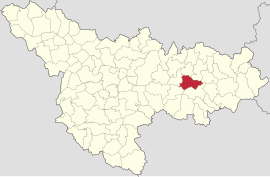Coșteiu (Hungarian: Kastély; German: Großkostil) is a commune in Timiș County, Romania. It is composed of five villages: Coșteiu (commune seat), Hezeriș, Păru, Țipari and Valea Lungă Română. It is located on the right bank of the Timiș River, downstream from Lugoj.
Coșteiu | |
|---|---|
 The Orthodox church in Coșteiu | |
 Location in Timiș County | |
| Coordinates: 45°44′N 21°51′E / 45.733°N 21.850°E | |
| Country | Romania |
| County | Timiș |
| Government | |
| • Mayor (2020–2024) | Petru Carebia[1] (PSD) |
| Area | 84.11 km2 (32.48 sq mi) |
| Population (2021-12-01)[3] | 3,815 |
| • Density | 45/km2 (120/sq mi) |
| Time zone | EET/EEST (UTC+2/+3) |
| Postal code | 307125–307129 |
| Vehicle reg. | TM |
| Website | costeiu |
History
editThe first recorded mention of Coșteiu dates from 1597.[4] The settlement was formed around a medieval castle known as Kastély,[5] from which its name is derived (in Hungarian kastély means "castle").[6] On the Josephinische Landesaufnahme of 1717, it was listed under the name Gustik. Today's village was formed by merging three hamlets after 1945: Coșteiu Mare (Hungarian: Nagykastély), Coșteiu Mic (Hungarian: Kiskastély) and Sâlha (Hungarian: Szilha).[7]
The Bega Canal played an important role in the history of Coșteiu. Work on the canal began in 1728. To regularize Bega, Dutch engineer Maximilien Emmanuel Fremaut built a dam near Coșteiu between 1759 and 1760.[8] It was rebuilt in 1860 after the catastrophic floods of the previous year.[9]
Demographics
editEthnic composition (2011)[10]
Religious composition (2011)[11]
Coșteiu had a population of 3,635 inhabitants at the 2011 census, down 5% from the 2002 census. Most inhabitants are Romanians (80.11%), larger minorities being represented by Hungarians (10.32%) and Roma (2.31%). For 6.74% of the population, ethnicity is unknown.[10] By religion, most inhabitants are Orthodox (69.46%), but there are also minorities of Reformed (6.99%), Greek Catholics (5.91%), Pentecostals (3.71%), Roman Catholics (2.81%), Adventists (2.12%) and Baptists (1.21%). For 6.77% of the population, religious affiliation is unknown.[11]
| Census[12] | Ethnic composition | ||||
|---|---|---|---|---|---|
| Year | Population | Romanians | Hungarians | Germans | Roma |
| 1880 | 4,456 | 4,376 | 29 | 47 | – |
| 1890 | 5,343 | 4,127 | 1,119 | 80 | – |
| 1900 | 6,020 | 4,340 | 1,581 | 79 | – |
| 1910 | 6,373 | 4,281 | 2,021 | 34 | – |
| 1920 | 5,557 | 3,816 | 1,729 | 6 | – |
| 1930 | 5,590 | 3,882 | 1,591 | 27 | 61 |
| 1941 | 5,213 | 3,679 | 1,466 | 16 | – |
| 1956 | 4,575 | 3,377 | 1,182 | 7 | 5 |
| 1966 | 4,500 | 3,383 | 981 | 21 | 110 |
| 1977 | 4,535 | 3,642 | 814 | 19 | 53 |
| 1992 | 3,762 | 3,087 | 593 | 14 | 58 |
| 2002 | 3,830 | 3,171 | 501 | 12 | 132 |
| 2011 | 3,635 | 2,912 | 375 | 8 | 84 |
References
edit- ^ "Results of the 2020 local elections". Central Electoral Bureau. Retrieved 16 June 2021.
- ^ "Primăria Coșteiu". Ghidul Primăriilor.
- ^ "Populaţia rezidentă după grupa de vârstă, pe județe și municipii, orașe, comune, la 1 decembrie 2021" (XLS). National Institute of Statistics.
- ^ Szabó, M. Attila (2003). Erdély, Bánság és Partium történeti és közigazgatási helységnévtára. Miercurea Ciuc: Pro-Print Kiadó.
- ^ "Fișa Primăriei comunei Coșteiu". Consiliul Județean Timiș.
- ^ Crețan, Remus (2006). Dicționar toponimic și geografico-istoric al localităților din județul Timiș. Timișoara: Editura Universității de Vest. ISBN 973-7608-65-8.
- ^ Barbu, Dinu (2013). Mic atlas al județului Timiș (caleidoscop) (PDF) (5th ed.). Timișoara: Artpress. p. 184. ISBN 978-973-108-553-1.
- ^ "Lista monumentelor istorice" (PDF). Institutul Național al Patrimoniului. Ministerul Culturii. 2015. p. 2488. Archived from the original (PDF) on 2022-10-23. Retrieved 2021-09-22.
- ^ Dumitru, Viorel (24 March 2019). "Monument unic! Casa stăvilar de la Coștei funcționează și astăzi, la 259 de ani de la inaugurare". Express de Banat.
- ^ a b "Tab8. Populația stabilă după etnie – județe, municipii, orașe, comune". Institutul Național de Statistică. Archived from the original on 2016-01-18. Retrieved 2021-09-22.
- ^ a b "Tab13. Populația stabilă după religie – județe, municipii, orașe, comune". Institutul Național de Statistică. Archived from the original on 2020-08-07. Retrieved 2021-09-22.
- ^ Varga, E. Árpád. "Temes megye településeinek etnikai (anyanyelvi/nemzetiségi) adatai 1880-2002" (PDF). Archived from the original (PDF) on 2007-06-10. Retrieved 2021-09-22.
